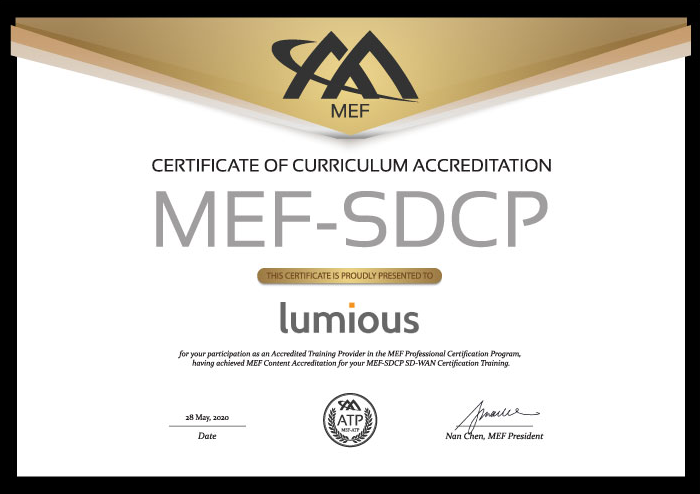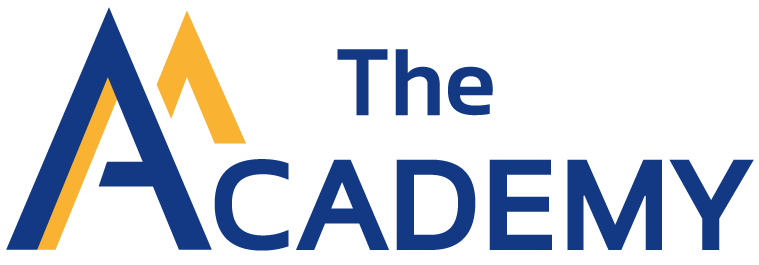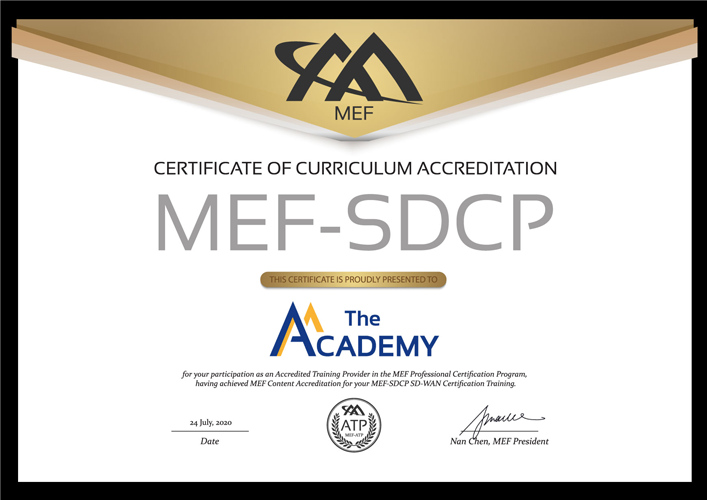MEF-SDCP (SD-WAN) Self-Study References
MEF provides MEF technical specifications, white papers and references which are both required and/or optional in preparation for the MEF exams.
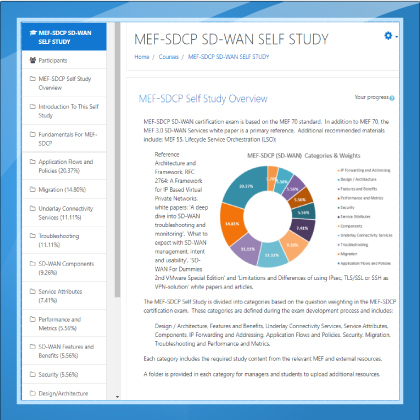
MEF-SDCP (SD-WAN) Self-Study Portal
MEF-SDCP (SD-WAN) Self-Study Portal
MEF provides a self-study portal, or site, which combines all study materials in a single location from which to learn the categories of the exam, and the associated content within each category. This approach is designed to assist those who meet the MQC (Minimally qualified candidate) requirements. It does not replace E-Learning or training products offered by MEF ATPs. Register ONLY with corporate email address.

Exam Blueprint
Exam Blueprint
Examinations are constructed using an examination blueprint — a widely accepted tool used within professions to design examinations. The blueprint, also referred to as the test specifications, identifies the content areas covered on the examination. For each content area, the blueprint outlines the weighting of the area, the topics, levels of competence, and learning objectives and competencies examined. The blueprint also provides information on the proportion of each question type presented in the examination (for example, multiple-choice, short-answer).
This is a required resource.

Exam Course Study Guideline
Exam Course Study Guideline
This guideline describes the knowledge needed for the MEF-SDCP exam (SD-WAN). The guideline provides greater detail regarding the knowledge areas to be studied in comparison to the exam blueprint. To create this guideline we reviewed each question relative to the subject area covered and its contents categorized into the appropriate technology area and organized 5 sections.
This is a required resource.

Exam Course Study Tips
Exam Course Study Tips
The MEF-SDCP Study Tips are designed to streamline your self-study. The tips highlight the most important guidelines and documents for study and provide the conceptual architecture and the learning methods considered in the development of the exam. Sample questions are also provided for context.
This is a required resource.
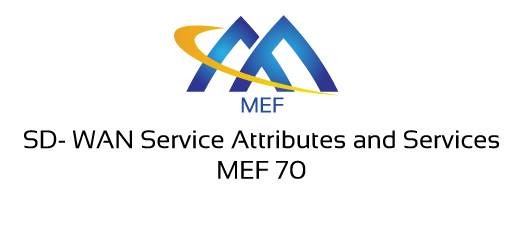
MEF 70
MEF 70 Service Attributes and Services
The SD-WAN Service Attributes and Services Standard defines the externally-visible behavior of SD-WAN Services. The Service description is based on an agreement between an SD-WAN Subscriber (the buyer) and an SD-WAN Service Provider (the seller) that includes agreement on the values of a set of SD-WAN Service Attributes defined in this document.
This is a required resource.

MEF 70 Acronyms and Abbreviations
MEF 70 Acronyms and Abbreviations
The table below lists the acronyms and abbreviations that are used in the exam without expansion. The candidate is expected to know the meaning of these without having them expanded in the questions.
This is a required resource.

MEF 70 Normative Terms
MEF 70 Normative Terms
These terms are used in the MEF-SDCP exam to reflect their usage in MEF 70. The candidate is expected to know the meaning of these without having them expanded in the questions.
This is a required resource.
MEF 3.0 SD-WAN Services - White Paper
MEF 3.0 SD-WAN Services - White Paper, MEF Marketing White Paper
This White Paper is intended forSD-WAN Service Providers and their enterprise customers who want to understand what a standardized,managed SD-WAN service is and the benefits it brings to the industry. The rapid growth in adoption of SD-WAN services is creating a major business opportunity for established telecom service providers, smaller access connectivity providers, system integrators moving up the value chainas well asa wide range of technology vendors supplying SD-WAN technology, value-addVNFs, service orchestration solutions,and more.
Caution: This is an older MEF White Paper (pre-MEF 70) that uses obsolete terminology. Focus on the concepts not terminology.
This is a required resource.
MEF 55
Lifecycle Service Orchestration (LSO): Reference Architecture and Framework
LSO is an agile approach to streamlining and automating the service lifecycle in a sustainable fashion for coordinated management and control across all network domains responsible for delivering an end-to-end Connectivity Service (e.g., Carrier Ethernet, IP VPN, MPLS, etc.). This document describes a Reference Architecture and Framework for orchestrating the service lifecycle.
This is an optional resource. Provides additional perspective.
RFC 2764
RFC 2764: A Framework for IP Based Virtual Private Networks, IETF
This document describes a framework for Virtual Private Networks (VPNs) running across IP backbones. It discusses the various different types of VPNs, their respective requirements, and proposes specific mechanisms that could be used to implement each type of VPN using existing or proposed specifications. The objective of this document is to serve as a framework for related protocol development in order to develop the full set of specifications required for widespread deployment of interoperable VPN solutions.
This is an optional resource. Provides additional perspective.
SD-WAN troubleshooting and monitoring
A deep dive into SD-WAN troubleshooting and monitoring, TechTarget.com
Whether in the throes of SD-WAN issues or preparing for the future, it's important for organizations to have practical steps to follow when taking on SD-WAN troubleshooting.
This is an optional resource. Provides additional perspective.
SD-WAN management
What to expect with SD-WAN management, intent and usability, TechTarget.com
Users can expect advancements in SD-WAN intent, usability and management, as vendors seek to improve their developer ecosystems, integration and multi-tenancy capabilities.
This is an optional resource. Provides additional perspective.
SD-WAN For Dummies 2nd VMware
SD-WAN For Dummies 2nd VMware Special Edition by Sanjay Uppal, Steve Woo and Dan Pitt
This easy-to-read book gives you jargon-free best practices for Software-Defined Wide Area Networking. Includes a special foreword by Lee Doyle, Doyle Research. Co-authored by Dan Pitt, Open Networking Foundation.
This is an optional resource. Provides additional perspective.
Limitations and Differences of using IPsec, TLS/SSL or SSH as VPN-solution
Limitations and Differences of using IPsec, TLS/SSL or SSH as VPN-solution, Ole Martin Dahl
Virtual private networks (VPNs) provide low-cost and secure access between hosts and/or networks. IPsec, TLS/SSL and SSH are popular technologies used to create VPNs. This article will point out some of the differences and limitations of using IPsec, TLS/SSL or SSH as VPN-solution.
This is an optional resource. Provides additional perspective.








